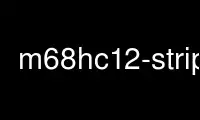
This is the command m68hc12-strip that can be run in the OnWorks free hosting provider using one of our multiple free online workstations such as Ubuntu Online, Fedora Online, Windows online emulator or MAC OS online emulator
PROGRAM:
NAME
strip - Discard symbols from object files.
SYNOPSIS
strip [-F bfdname |--target=bfdname]
[-I bfdname |--input-target=bfdname]
[-O bfdname |--output-target=bfdname]
[-s|--strip-all]
[-S|-g|-d|--strip-debug]
[-K symbolname |--keep-symbol=symbolname]
[-N symbolname |--strip-symbol=symbolname]
[-w|--wildcard]
[-x|--discard-all] [-X |--discard-locals]
[-R sectionname |--remove-section=sectionname]
[-o file] [-p|--preserve-dates]
[--keep-file-symbols]
[--only-keep-debug]
[-v |--verbose] [-V|--version]
[--help] [--info]
objfile...
DESCRIPTION
GNU strip discards all symbols from object files objfile. The list of object files may
include archives. At least one object file must be given.
strip modifies the files named in its argument, rather than writing modified copies under
different names.
OPTIONS
-F bfdname
--target=bfdname
Treat the original objfile as a file with the object code format bfdname, and rewrite
it in the same format.
--help
Show a summary of the options to strip and exit.
--info
Display a list showing all architectures and object formats available.
-I bfdname
--input-target=bfdname
Treat the original objfile as a file with the object code format bfdname.
-O bfdname
--output-target=bfdname
Replace objfile with a file in the output format bfdname.
-R sectionname
--remove-section=sectionname
Remove any section named sectionname from the output file. This option may be given
more than once. Note that using this option inappropriately may make the output file
unusable.
-s
--strip-all
Remove all symbols.
-g
-S
-d
--strip-debug
Remove debugging symbols only.
--strip-unneeded
Remove all symbols that are not needed for relocation processing.
-K symbolname
--keep-symbol=symbolname
When stripping symbols, keep symbol symbolname even if it would normally be stripped.
This option may be given more than once.
-N symbolname
--strip-symbol=symbolname
Remove symbol symbolname from the source file. This option may be given more than
once, and may be combined with strip options other than -K.
-o file
Put the stripped output in file, rather than replacing the existing file. When this
argument is used, only one objfile argument may be specified.
-p
--preserve-dates
Preserve the access and modification dates of the file.
-w
--wildcard
Permit regular expressions in symbolnames used in other command line options. The
question mark (?), asterisk (*), backslash (\) and square brackets ([]) operators can
be used anywhere in the symbol name. If the first character of the symbol name is the
exclamation point (!) then the sense of the switch is reversed for that symbol. For
example:
-w -K !foo -K fo*
would cause strip to only keep symbols that start with the letters "fo", but to
discard the symbol "foo".
-x
--discard-all
Remove non-global symbols.
-X
--discard-locals
Remove compiler-generated local symbols. (These usually start with L or ..)
--keep-file-symbols
When stripping a file, perhaps with --strip-debug or --strip-unneeded, retain any
symbols specifying source file names, which would otherwise get stripped.
--only-keep-debug
Strip a file, removing contents of any sections that would not be stripped by
--strip-debug and leaving the debugging sections intact. In ELF files, this preserves
all note sections in the output.
The intention is that this option will be used in conjunction with --add-gnu-debuglink
to create a two part executable. One a stripped binary which will occupy less space
in RAM and in a distribution and the second a debugging information file which is only
needed if debugging abilities are required. The suggested procedure to create these
files is as follows:
1.<Link the executable as normal. Assuming that is is called>
"foo" then...
1.<Run "objcopy --only-keep-debug foo foo.dbg" to>
create a file containing the debugging info.
1.<Run "objcopy --strip-debug foo" to create a>
stripped executable.
1.<Run "objcopy --add-gnu-debuglink=foo.dbg foo">
to add a link to the debugging info into the stripped executable.
Note - the choice of ".dbg" as an extension for the debug info file is arbitrary.
Also the "--only-keep-debug" step is optional. You could instead do this:
1.<Link the executable as normal.>
1.<Copy "foo" to "foo.full">
1.<Run "strip --strip-debug foo">
1.<Run "objcopy --add-gnu-debuglink=foo.full foo">
ie the file pointed to by the --add-gnu-debuglink can be the full executable. It does
not have to be a file created by the --only-keep-debug switch.
Note - this switch is only intended for use on fully linked files. It does not make
sense to use it on object files where the debugging information may be incomplete.
Besides the gnu_debuglink feature currently only supports the presence of one filename
containing debugging information, not multiple filenames on a one-per-object-file
basis.
-V
--version
Show the version number for strip.
-v
--verbose
Verbose output: list all object files modified. In the case of archives, strip -v
lists all members of the archive.
@file
Read command-line options from file. The options read are inserted in place of the
original @file option. If file does not exist, or cannot be read, then the option
will be treated literally, and not removed.
Options in file are separated by whitespace. A whitespace character may be included
in an option by surrounding the entire option in either single or double quotes. Any
character (including a backslash) may be included by prefixing the character to be
included with a backslash. The file may itself contain additional @file options; any
such options will be processed recursively.
Use m68hc12-strip online using onworks.net services